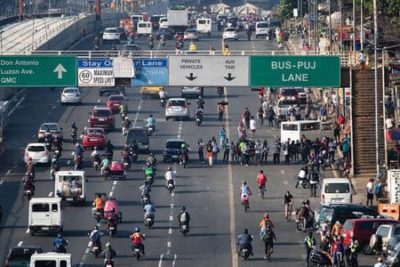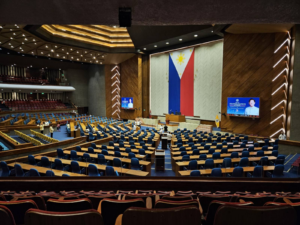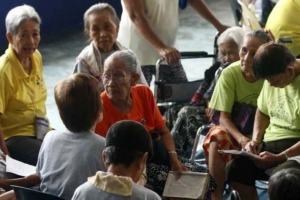
Starting June 1, President Rodrigo Duterte said only Metro Manila, Cagayan Valley, Central Luzon, CALABARZON, Pangasinan, Albay, and Davao City will be under general community quarantine.
Below are the key differences in community quarantine protocols in GCQ and MGCQ areas:
HEALTH STANDARDS
GCQ and MGCQ: Minimum public health standards shall be complied with at all times.
MOVEMENT
GCQ: Movement should be limited to accessing essential goods and services, and for work in the offices or industries permitted to operate. Persons below 21 and those who are 60 and above, those with immunodeficiency, comorbidities, or other health risks, and pregnant women should stay home at all times unless they have to buy essential goods and services, or are allowed to work in permitted industries.
MGCQ: All persons are allowed outside their residence.
TRANSPORTATION
GCQ: Road, rail, maritime, and aviation sectors of public transportation shall operate at a reduced operational and vehicle capacity. A minimum of 1-meter physical distancing in public transport is required.
MGCQ: Road, rail, maritime, and aviation sectors of public transportation shall operate in accordance with the guidelines of the Department of Transportation. A minimum of 1-meter physical distancing in public transport is required.
Private transportation shall be allowed and the use of bikes is strongly encouraged.
EDUCATION
- K TO 12 EDUCATION
GCQ: Face-to-face classes from Aug. 24 will only be allowed when the local risk severity grading permits, and subject to compliance with minimum health standards.
MGCQ: Basic Education Learning Continuity Plan of DepEd will be adopted.
- HIGHER EDUCATION INSTITUTIONS
GCQ: Opening of classes will be based on education delivery mode. No face-to-face classes until Aug. 31.
MGCQ: Face-to-face classes are allowed but with strict compliance to minimum health standards. HEI activities that involve mass gathering of students are still prohibited.
MASS GATHERINGS
GCQ: Non-work essential, entertainment-related mass gatherings are prohibited. Religious gatherings should be limited to 10 people only.
MGCQ: Public gatherings are allowed provided the participants shall be limited to 50 percent of the venue or seating capacity.
GOVERNMENT WORK
GCQ: Work in all government offices may be at full operational capacity or under such alternative work arrangements allowed by the Civil Service Commission.
MGCQ: Physical reporting for work is allowed in full capacity with alternative arrangements for those 60 and above, those with immunodeficiency, comorbidities, or other health risks, and pregnant women.
EXERCISES
GCQ: Individual outdoor exercises are allowed such as walking, jogging, running, or biking. Wearing face masks and physical distancing is required.
MGCQ: Individual and group outdoor exercises including non-contact sports such as golf, tennis, table tennis, swimming are allowed. Minimum public health standards should be observed.
CONSTRUCTION WORK
GCQ and MGCQ: All public and private construction projects shall be allowed, but with strict compliance to construction safety guidelines during the COVID-19 pandemic.
BUSINESS SECTORS
GCQ: The following industries are allowed to operate under the provided capacity
- FULL CAPACITY
– Power, energy, water, utilities, agriculture, fishery and forestry industries, food manufacturing and food supply chain businesses, food retail establishments such as supermarkets, food preparation establishments limited to take-out and delivery services, health-related establishments, logistics, information technology and telecommunications, and the media
- 50 PERCENT TO FULL CAPACITY
-Mining and other manufacturing, electronic commerce, delivery, repair and maintenance, and housing and office services
- 50 PERCENT WORK ONSITE
– Financial services, legal and accounting, auditing services, professional services, scientific services, technical services, non-leisure services, non-leisure wholesale and retail
MGCQ: The following industries are allowed to operate under the provided capacity
- FULL CAPACITY
– Power, energy, water, utilities, agriculture, fishery and forestry industries, food manufacturing and food supply chain businesses, food retail establishments such as supermarkets, food preparation establishments limited to take-out and delivery services, health-related establishments, logistics, information technology and telecommunications, and the media
-Mining and other manufacturing, electronic commerce, delivery, repair and maintenance, and housing and office services
– Financial services, legal and accounting, auditing services, professional services, scientific services, technical services, non-leisure services, non-leisure wholesale and retail
- 50 PERCENT CAPACITY
– Barbershops, salons, personal care establishments, dine-in services.
These are based on the guidelines issued by the inter-agency task force on emerging and infectious diseases (IATF-EID).















